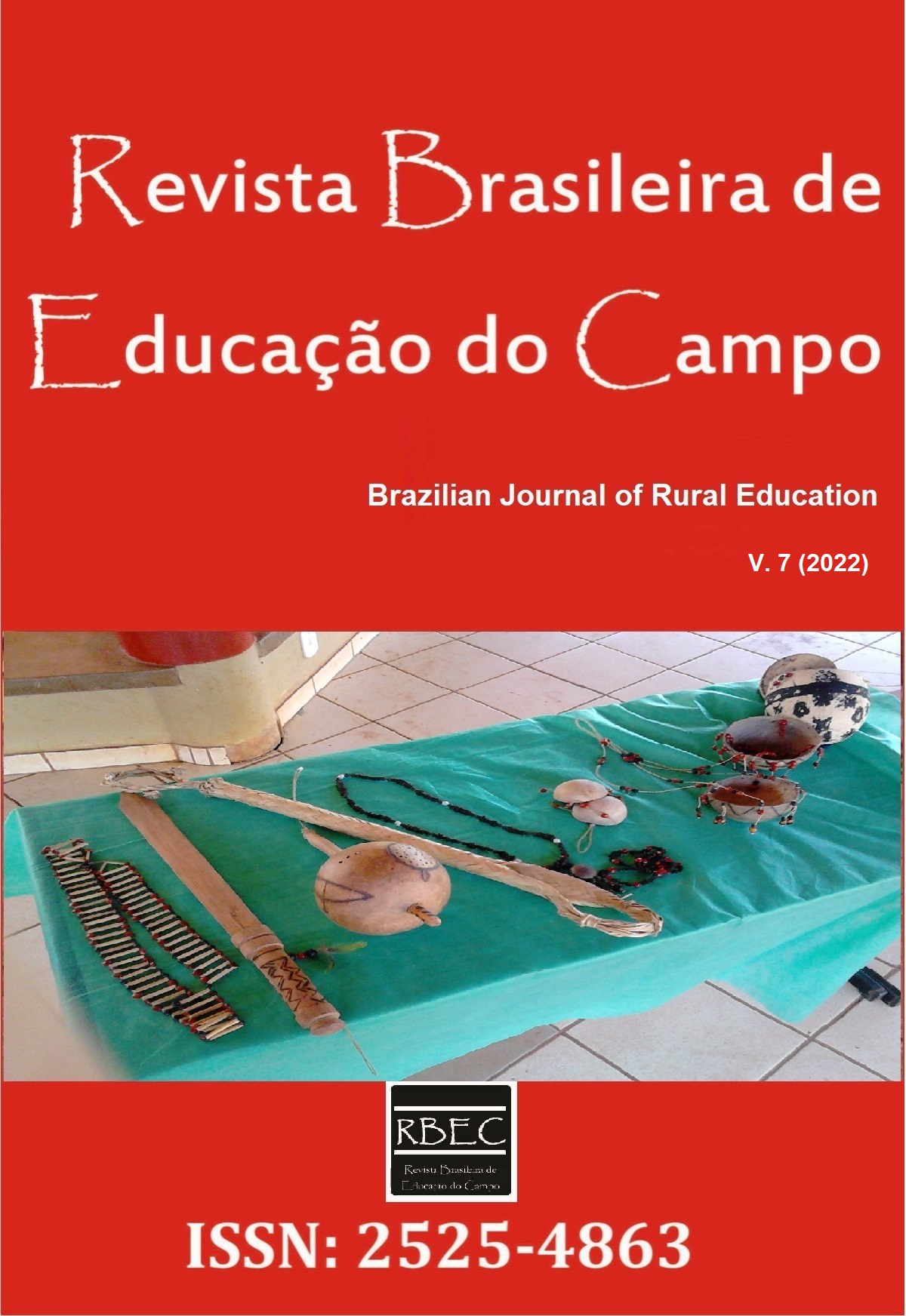The participation of women in the Family Farming and Popular Economy Solidarity Fair in the Inhamuns and Crateús territory of Ceará
DOI:
https://doi.org/10.20873/uft.rbec.e12924Schlagworte:
Family Farming, Popular Solidarity Economy, Feminist Economy, Rural EducationAbstract
ABSTRACT. The article aims to analyze the participation of women in the Family Farming and Popular Economy Solidarity Fair in the territory of Inhamuns and Crateús, in Ceará, organized by Caritas of the Diocese of Crateús. To this end, we contextualized the emergence of the fair in the region, based on the systematization of this experience in the context of the articulation of different subjects. The research was based on a qualitative approach through bibliographic research and field research, with the following categories: Solidarity Economy; Popular Solidarity Economy and Feminist Economy. We sustain two arguments resulting from the research: (a) the Family Farming and Popular Solidarity Economy Fair of the territory of Inhamuns and Crateús builds a subjectivity linked to Rural Education and the so—called Pedagogy of the Movement, especially by strengthening the identity with the peasant territory linked to family and peasant production ,and, (b) women contribute to this process in an educational-pedagogical dimension, since they are formed within the Fair, while influencing the nature of the Fair, especially by their contribution to the strengthening of the Popular Solidarity Economy in a feminist perspective.
Downloads
Literaturhinweise
Arroyo, M.G., Caldart, R. S., & Molina, M.C. (Org.). (2011). Por uma Educação do Campo. Petrópolis, RJ: Vozes.
Barbosa, L. P. (2021). De las mujeres como energía vital y las reverberaciones de la lucha en defensa de los territorios y los comunes en América Latina. In Cisneros, A. C., Bustamante, M. O., & Nucamendi, M. N. (Orgs.). Territorios para la vida. Mujeres en defensa de sus bienes naturales y por la sostenibilidad de la vida (pp. 23-58). Tuxtla Gutiérrez, Chiapas: Universidad de Ciencias y Artes de Chiapas.
Barbosa, L. P., Bustamante, M. O., & Cisneros, A.C. (2020). Apresentação. O histórico caminhar das mulheres indígenas e camponesas na defesa dos territórios e dos bens comuns na América Latina. O Público e O Privado, 18(35), 09-16.
Barbosa, L. P., & Rosset, P. M. (2017). Educação do Campo e Pedagogia Camponesa Agroecológica na américa latina: aportes da La Via Campesina e da CLOC. Educação & Sociedade, 38(140), 705-724. https://doi.org/10.1590/es0101-73302017175593
Bustamante, M. O. (2019). La exclusión de las mujeres de la tierra. Una mirada en el espejo de la economía feminista. In Queiroga Díaz, N., & Dobrée P. (Org.). Luchas y alternativas para una economía feminista emancipatoria (pp. 269-283). Asunción: Centro de Documentación y Estudios/ Articulación Feminista Marcosur. https://doi.org/10.2307/j.ctvt6rkw2.18
Bustrón, M. A. G., & Guízar, J. M. C. (2019). Aportes desde la economía feminista a la construcción de otra economía no capitalista y no patriarcal. In Queiroga Diaz, N., & Dobrée, P. (Orgs.). Luchas y alternativas para una economía feminista emancipatoria (pp. 216-252). Asunción: Centro de Documentación y Estudios/Articulación Feminista Marcosur. https://doi.org/10.2307/j.ctvt6rkw2.16
Caldart, R. S. (2000). Pedagogia do Movimento Sem Terra: escola é mais do que escola. Petrópolis, RJ: Vozes.
Carvalho, H. M. (2012). O campesinato contemporâneo como modo de produção e como classe social. Curitiba.
Dobrée, P., & Diaz, N. Q. (2019). Perspectivas polifónicas para uma economía feminista emancipatoria. In Queiroga Diaz, N., & Dobrée, P. (Org.). Luchas y alternativas para una economía feminista emancipatoria (pp. 19-48). Asunción: Centro de Documentación y Estudios/ Articulación Feminista Marcosur. https://doi.org/10.2307/j.ctvt6rkw2.4
Freire, P. (1981). Ação cultural para a liberdade. Rio de Janeiro: Paz e Terra.
Goerck, C. (2005). Economia popular solidária: no processo de reestruturação produtiva brasileira. Revista Virtual Textos e Contextos, (4), ano IV.
Machado, L. C. P., & Machado, L. C. P. F. (2014). A dialética da agroecologia: Contribuição para um mundo com alimentos sem veneno. São Paulo: Expressão Popular.
Martins, Y. V. (2018). A formação da identidade política das mulheres camponesas: uma análise da marcha das margaridas (Trabalho de Conclusão de Curso). Universidade Estadual do Ceará, Crateús.
Moreira, S. L. S., Ferreira, P. A., & Siliprandi, E. (2018). Memorias das mulheres na agroecologia do Brasil. In Sánchez, G. P. Z., Vargas, G. C., & Siliprando, E. (Orgs.). Agroecologia em femenino. Reflexiones a partir de nuestras experiencias. SOCLA. Impreso en La Paz, Estado Plurinacional de Bolivia.
Singer, P. (2002). Introdução à economia solidária. São Paulo: Editora Fundação Perseu Abramo.
Silva, M. L. V. (2014). Gritos, silêncios e sementes: As Repercussões do Processo de Des-reterritorialização empreendido pela Modernização Agrícola sobre o Ambiente, o Trabalho e a Saúde de Mulheres Camponesas na Chapada do Apodi/CE (Dissertação de Mestrado). Universidade Federal do Ceará, Fortaleza.
Veröffentlicht
Zitationsvorschlag
Ausgabe
Rubrik
Lizenz
Creative Commons Attribution License
Creative Commons Attribution License
Proposal for Copyright Notice Creative Commons
1. Policy Proposal to Open Access Journals
Authors who publish with this journal agree to the following terms:
A. Authors retain copyright and grant the journal right of first publication with the work simultaneously licensed under the Creative Commons Attribution License that allows sharing the work with recognition of its initial publication in this journal.
B. Authors are able to take on additional contracts separately, non-exclusive distribution of the version of the paper published in this journal (ex .: publish in institutional repository or as a book), with an acknowledgment of its initial publication in this journal.
C. Authors are permitted and encouraged to post their work online (eg .: in institutional repositories or on their website) at any point before or during the editorial process, as it can lead to productive exchanges, as well as increase the impact and the citation of published work (See the Effect of Open Access).














